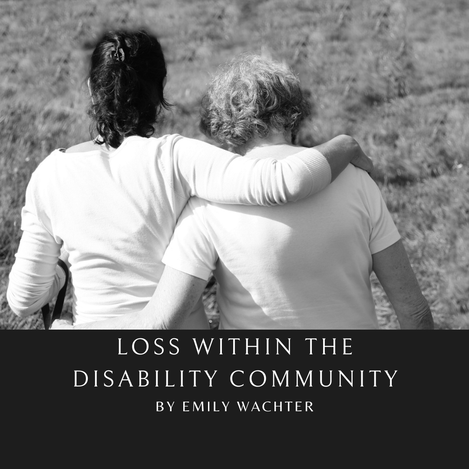|
I recently experienced loss of someone I knew from one of my social groups I am a member of. Let's call him A. A was sweet and always smiling young man. A probably understood the world in ways other people couldn't. A passed away on Sunday at the age of 17. A was entirely too young for anyone to pass away. Because of his passing, I'm reminded of the unique loss within the disability community. Grief can take many forms. Grief is described as a loss of some sort, psychological distress, confusion, shock, yearning, and/or anxiety about the future. Loss takes many forms within the disability community. Some examples include:
We also must recognize that older people with developmental/ intellectual disabilities may have a cumulative loss. Cumulative loss can be referred to as multiple losses in a short period. In people with disabilities, we must look at a loss within a person's lifetime.Some things to think about if you support someone with a disability
What can grief look like? For individuals with developmental/intellectual disabilities and autism, grief can be hard to understand and/or difficult to express. They may also struggle to make sense of loss. They may have difficulty finding the silver lining or benefit of that loss. They may need extra support during that time, and whoever is taking care of them may not be able to know how to support them. There is not much research about those with intellectual disabilities and whether or not they can find the benefit in the loss or if they're unaffected by it. A study conducted by Harper and Wadsworth found that over half of the respondents with a developmental disability reported at least one death that was very disruptive to their lives; more than a year after the deaths, the majority of these respondents were still suffering from feelings of loneliness, anxiety, and sadness, as well as from behavior problems. I think this study points to the isolation felt by living with a disability. Often people with disabilities are isolated and spend lots of time in the mind. If you cannot express your grief to those around you, it encourages self-harm and harm to others. How do we support those with disabilities in their grief?
Sources: https://www.forbes.com/sites/andrewpulrang/2020/05/26/we-know-theres-a-disability-community-because-we-mourn-our-losses/?sh=5555c70f98c4 Brickell, C., & Munir, K. (2008). Grief and its complications in individuals with intellectual disability. Harvard review of psychiatry, 16(1), 1–12.. https://www.ncbi.nlm.nih.gov/pmc/articles/PMC3166634/ Harper DC, Wadsworth JS. Grief in adults with mental retardation: preliminary findings. Res Dev Disabil. 1993;14:313–330. [PubMed] [Google Scholar] http://www.intellectualdisability.info/mental-health/articles/managing-grief-better-people-with-intellectual-disabilities https://www.mylepage.ca/wp-content/uploads/2019/03/Guidebook-for-People-with-IDs-.pdf
0 Comments
*|MC_PREVIEW_TEXT|*
|
About our BlogThe Barrier-Free blog exists as a space to share Barrier-Free news, helpful information, and a creative sharing space. Archives
March 2024
Categories
All
|
||||||||||||||||||||||||||||||||||||||||||||||||||||||||||||||||||||||||||||||||||||||||||||||||||||||||||||||||||||||||||||||||||||||||||||||||||||||||||||||||||||||||||||||||||||||||||||||||||||||||||||||||||||||||||||||||||||||||||||||||||||||||||||||||||||||||||||||||||||||||||||||||||||||||||||||||||||||||||||||||||||||||||||||||||||||||||||||||||||||||||||||||||||||||||||||||||||||||||||||||||||||||||||||||||||||||||||||||||||||||||||||||||||||||||||||||||||||||||||||||||||
|
Copyright © Barrier-Free 501(c)(3) All rights reserved.
|
|
































